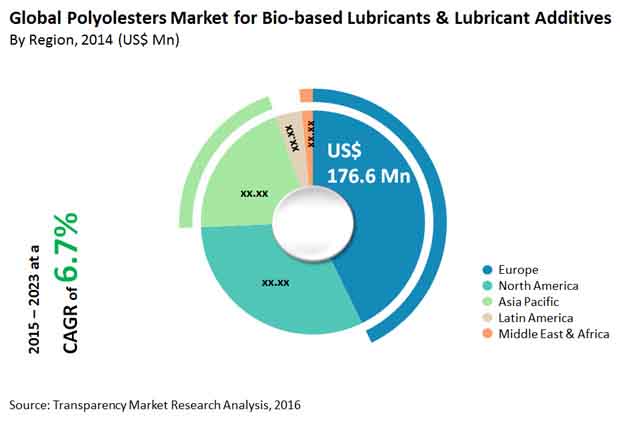Global Polyolesters for Bio-based Lubricants and Lubricant Additives Market: Overview
Polyolester lubricants (POE) are lubricant oils that used in a wide range of application as they can work under varying temperatures, which range anywhere between -75 F to 600 F. The remarkable adaptability of these lubricants, high solvency and dispersibility, good oxidative stability, and low volatility are expected to make a significant contribution to the soaring revenue of the global polyolesters for bio-based lubricants and lubricants additives market. Transparency Market Research states that the global market polyolesters for bio-based lubricants and lubricant additives is expected to be worth US$735.9 mn by 2023 from US$412.9 mn in 2014. During the forecast period of 2015 and 2023, the global market is expected to exhibit a CAGR of 6.7%.
The market is also benefitting from the implementation of tougher norms pertaining to emissions. Polyolesters are bio-based lubricants, which makes them fairly clean. Thus, to overcome the concerns about hazardous impact of petroleum-based lubricants, several end users are turning their attention of polyolesters for developing bio-based lubricants and lubricant additives. The market is expected to gain significant prominence in the near future as the world continues to restore the environment by combatting global warming through stringent emission norms.

Trimethylolpropanes to Be Highly Sold Products in Global Market
The various types of products available in the global polyolesters for bio-based lubricants and lubricant additives market are pentaerythritols, neopentyl glycols, trimethylolpropanes, and dipentaerythritols. Of these, trimethylolpropane-based polyolesters product segment is expected to lead the global market in the coming years. The demand for trimethylolpropane is expected to rise due to its widening application over other polyolesters. During the forecast period, this product segment is expected to expand at a CAGR of 7.9%.
Polyolesters are extensively being used in the production of aviation oil, refrigerant oil, metalworking oil, compressor oil, automotive lubricants, industrial gears, industrial greases, and transformer oil. The report suggests that the global polyolesters market is expected to gain importance in the aviation industry in the coming years. As of 2014, the aviation oil application segment held a share of about 30% in the overall market. The progress of this segment will be supported by the increasing concerns about air pollution and tough emission norms. Thus, a shift toward cleaner lubricants and additives is expected to be an emerging trend in the global market.
Europe to Lead as Region Shows Sincere Efforts to Cut Down Emissions
Geographically, the global polyolesters market for bio-based lubricants and lubricant additives is segmented into Asia Pacific, Europe, North America, the Middle East and Africa, and Latin America. Of these, Europe is leading the pack as the region has been sincere in cutting down its carbon emissions. In terms of volume, in 2014, Europe polyolesters market for bio-based lubricants and lubricant additives held a 40% share in the overall market. The high level of awareness about importance of sustainable and environment-friendly options along with stringent emission control norms are expected to keep this regional market ahead of others.
On the other hand, the North America polyolesters market for bio-based lubricants and lubricant additives is also expected to emerge as a significant one in the foreseeable future. The rise of industries such as refrigeration, aviation, and automotive are expected to bolster the growth of this regional market in the near future.
The key players operating in the global polyolesters for bio-based lubricants and lubricant additives market are Ecogreen Oleochemicals, NOF CORPORATION, Croda International Plc, Emery Oleochemicals, Oleon NV, Peter Greven GmbH & Co. KG, Kuala Lumpur Kepong Berhad, A&A Fratelli Parodi Spa, Custom Synthesis, LLC, Dowpol Corporation, and Lumar Quimica.
Inclination toward Sustainable Additives to Propel Growth Prospects across the Polyolesters for Bio-Based Lubricants and Lubricants Additives Market
The polyolesters for bio-based lubricants and lubricants additives market is expected to gain tremendous growth opportunities on the back of the increasing awareness about environmental conservation among a large chunk of the global populace. Many manufacturers prefer bio-based lubricants instead of petroleum-based lubricants, which helps the polyolesters for bio-based lubricants and lubricants additives market to increase its growth rate.
Polyolesters are bio-based and do not harm the environment. It is a feasible option for replacing petroleum-based lubricants. The hazardous impacts of using petroleum-based lubricants have damaged the environment to a great extent. This factor has led to an increase in the utilization of polyolesters greatly. Thus, all these aspects bode well for the growth of the polyolesters for bio-based lubricants and lubricants additives market.
Research and development activities are an important component for the growth of the polyolesters for bio-based lubricants and lubricants additives market. The players in the polyolesters for bio-based lubricants and lubricants additives market always focus on these activities for discovering novel insights.
Activities like mergers, acquisitions, joint ventures, and partnerships are crucial for accelerating the growth opportunities of the polyolesters for bio-based lubricants and lubricants additives market. These activities help the players to strengthen their foothold, eventually increasing the growth rate.
The COVID-19 pandemic has changed the growth projections of a large number of industries and sectors. The polyolesters for bio-based lubricants and lubricants additives market is no exception. The government bodies of numerous countries announced strict lockdowns to curb the transmission of COVID-19. This factor impacted the growth prospects of the polyolesters for bio-based lubricants and lubricants additives market to a considerable extent.
However, many relaxations were introduced after a brief period which is proving to be a boon for the polyolesters for bio-based lubricants and lubricants additives market to revive their growth.
Table of Contents
Chapter 1 Preface
Chapter 2 Executive Summary
Chapter 3 Polyolesters for Bio-based Lubricants and Lubricant Additives Market – Industry Analysis
Chapter 4 Manufacturing & Price Trend Analysis
Chapter 5 Polyolesters for Bio-based Lubricants and Lubricant Additives Market – Product Analysis
Chapter 6 Polyolesters for Bio-based Lubricants and Lubricant Additives Market – Application Analysis
Chapter 7 Polyolesters for Bio-based Lubricants and Lubricant Additives Market - Regional Analysis
Chapter 8 Company Profiles
Chapter 9 Primary Research – Key Findings